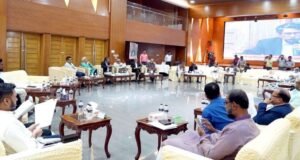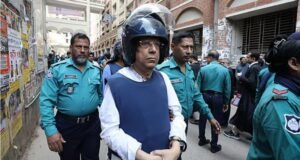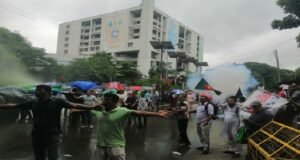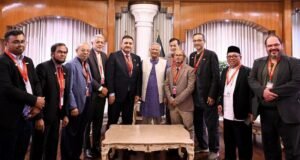
Today marks the eleven-year anniversary of the Rana Plaza building collapse, a catastrophic event in Bangladesh’s garment industry history that claimed the lives of approximately 1,134 workers and left 2,500 others injured in 2013.
Regarded as one of the largest industrial disasters in the global clothing sector, the quest for justice remains elusive even after over a decade.
Every year, as the day returns, families of the deceased workers and injured survivors, along with labour leaders and activists, gather at the site in Savar to honour the victims and renew their call for justice.
This year was no exception.
This morning, floral tributes were laid at the makeshift memorial while labour organisations held vigils and meetings to emphasise their longstanding appeals.
Their demands encompass various measures, including identifying all responsible parties, ensuring maximum punishment for those culpable, including building owner Sohail Rana, revising compensation laws and providing financial support to affected families, providing lifetime income compensation, comprehensive long-term treatment and rehabilitation for the injured workers, building a permanent monument at the site, establishing an emergency fund to support all workers and designating 24 April as a national day of mourning and safety day, with the closure of all factories.
Rafiqul Islam Sujan, president of the Bangladesh Garment and Industrial Workers Federation, lamented the lack of progress, noting the plight of injured workers who have not received adequate compensation or proper rehabilitation.
He said, “After eleven long years, our demands remain unaddressed. Many injured workers have passed away without receiving justice or proper compensation. It is disheartening that a permanent monument has yet to be erected at the site. We continue to stand here with the same demands, hoping for meaningful action,
Bulbuli Akhter, a worker injured in the Rana Plaza tragedy, lamented her ongoing plight, stating, “I am enduring an inhumane existence after being crippled by the collapse. Despite a mere token donation, I have yet to receive proper compensation or justice. None of our demands have been addressed.”
Similarly, Hawa Begum, who was on the 8th floor during the incident along with her daughter and sister-in-law, shared her struggles, saying, “Though I survived, my life has been far from normal. My daughter and I continue to suffer from serious injuries, making everyday life unbearable. We are still awaiting rightful compensation.”
Joining them were numerous other injured workers gathering at Rana Plaza, each echoing similar grievances.
Every year, on this day, Abdul Mannan pays a visit to the site in Saval from Barishal to mourn his son Rafiqul, who perished while working on the 5th floor.
He said, “Rafiqul, my fourth child among seven, was laid to rest after being recovered 14 days post-collapse. Yet, justice still eludes us.”
Families of the victims and rights groups alike perceive the tragedy as premeditated murder and demand severe punishment for the perpetrators.
Sarwar Hossain, General Secretary of the Garment Workers Union, asserted, “The Rana Plaza collapse was no accident but a calculated act of murder. It’s disheartening that justice remains elusive. We urge for maximum punishment for the guilty, echoing the collective demand of all.”
 Weekly Bangla Mirror | Bangla Mirror, Bangladeshi news in UK, bangla mirror news
Weekly Bangla Mirror | Bangla Mirror, Bangladeshi news in UK, bangla mirror news







